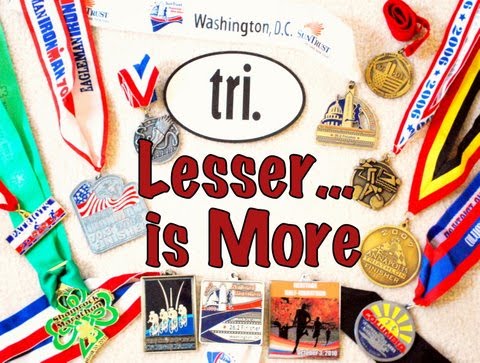For anyone who has been reading for a while, I'm sure you can gather that part of the reasoning for the name has to do with a play on my last name. And that was pretty much the reasoning why I went down the path of the name I ultimately decided on many years ago. But that wasn't the only reason...
After having been involved in sports for a long time, I've come to analyze and interpret the various training methodologies that I have been coached under and implemented myself. And having started competing in triathlons and having been a runner for much longer before I started the blog, I also began studying and testing out the different training techniques to see which ones work best. So I guess what I'm trying to say is that over the course of my history as an athlete, I've found that a "less is more" approach tends to work well. Of course, a simple statement like that starts churning gears in people's heads which leads to assumptions about what that means. When I say "less is more", I don't mean not training a lot. It is just relative to what I consider "most" people do. I just tend to believe that you can achieve more efficient and effective results that way, as opposed to some other approaches out there. And I'll explain a bit further down more specifically how.
Now, what you'll find if you scan around the interwebs long enough are a whole bunch of people posting about epic this and epic that. And then you come to find out they are training for something shorter, relative to the workouts they are putting themselves through. Overdistance training is one thing, but even if you are training for an Ironman, there is no need to run a marathon and/or ride 150+ miles as part of your build up. There is a law of diminishing returns and at a certain point, all you are doing is creating more stress, but without the equivalent benefit coming to your for that effort. And for people that are training for an Olympic distance triathlon, riding a century is something I'd consider excessive as well. In order to ride 25 miles hard, training for 50 mile rides seems more reasonable if you feel the need to go longer, but centuries offer very little benefit to someone who will be racing 25 miles. We call this the volume approach or, to play on my motto, "more is more"...or for another explanation - nuts if you ask me.
The theory here is that by scaling every mountain and leaving no stone unturned, your body will be prepared to handle anything. And that may be true to an extent, but you are also leaving yourself without much preparation for your actual race. You may be fit, but you aren't race fit. The key here being specificity in what you are training for.
Training philosophies should be determined by what you are training for and focus on specificity for that particular event. However, killing yourself through epic workouts that are either way too much for a particular distance or way too early to serve the intended purpose of such a workout and the reasons where I think a lot of people go wrong. And while this isn't to say you can't get by with that kind of approach, you certainly can. But you risk injury, burnout, and a lack of specificity that isn't going to get you race ready.
What will get you race ready? A logical approach that allows you to put in hard workouts consistently, relative to the event you are training for, so that you can stress, recover, adapt, and improve over time. One that doesn't require epic workouts for 6-8 months to train for one event. Seriously. If you are training for a marathon, running 20+ miles with 4 months till your race isn't going to do anything other than prevent you from getting in a ton of quality training. Instead, you'll be spending a fair amount of time recovering, or worse, pushing through continued fatigue for months on end, only to find yourself injured or burnt out by the time your race actually happens. Think this sounds silly? It isn't. I see it a lot and when people explain how awesome their training was going and how bad their race was, I can usually point to something like this and say why..
I also get that some people enjoy the journey and that the race is only part of the equation. I'd call these people endurance lifestyle athletes. To some of them, the race doesn't matter. It's the epic workouts that do and there is absolutely nothing wrong with that. So if that is you, keep doing whatever makes you happy. We do this to make ourselves healthy and happy, right? However, if you are trying to train your best, you better hunker down with your workout log and look at your approach, because you may be falling victim of an excessive training approach for your race. More is not always better. Sometimes, lesser is more.

No comments:
Post a Comment